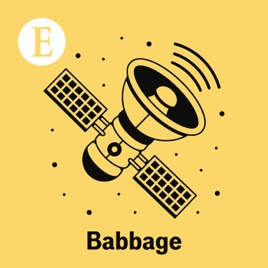
Advertise on podcast: Babbage from The Economist
Rating
4.8 from
Country
This podcast has
467 episodes
Language
Publisher
Explicit
No
Date created
2012/03/06
Average duration
45 min.
Release period
5 days
Description
Babbage is our weekly podcast on science and technology, named after Charles Babbage—a 19th-century polymath and grandfather of computing. Host Alok Jha talks to our correspondents about the innovations, discoveries and gadgetry shaping the world. Published every Wednesday. If you’re already a subscriber to The Economist, you’ll have full access to all our shows as part of your subscription. For more information about Economist Podcasts+, including how to get access, please visit our FAQs page here https://myaccount.economist.com/s/article/What-is-Economist-Podcasts Hosted on Acast. See acast.com/privacy for more information.
Social media
Check Babbage from The Economist social media presence
Podcast episodes
Check latest episodes from Babbage from The Economist podcast
Babbage: The hunt for dark matter
2024/02/21
Dark matter is thought to make up around a quarter of the universe, but so far it has eluded detection by all scientific instruments. Scientists know it must exist because of the ways galaxies move and it also explains the large-scale structure of the modern universe. But no-one knows what dark matter actually is.
Scientists have been hunting for dark matter particles for decades, but have so far had no luck. At the annual meeting of the American Association for the Advancement of Science, held recently in Denver, a new generation of researchers presented their latest tools, techniques and ideas to step up the search for this mysterious substance. Will they finally detect the undetectable?
Host: Alok Jha, The Economist’s science and technology editor. Contributors: Don Lincoln, senior scientist at Fermi National Accelerator Laboratory; Christopher Karwin, a fellow at NASA’s Goddard Space Flight Center; Josef Aschbacher, boss of the European Space Agency; Michael Murra of Columbia University; Jodi Cooley, executive director of SNOLAB; Deborah Pinna of University of Wisconsin and CERN.
Get a world of insights for 50% off—subscribe to Economist Podcasts+
If you’re already a subscriber to The Economist, you’ll have full access to all our shows as part of your subscription. For more information about how to access Economist Podcasts+, please visit our FAQs page or watch our video explaining how to link your account.
Hosted on Acast. See acast.com/privacy for more information.
more
Babbage picks: Can Russia catch up with the West in AI?
2024/02/14
An article from The Economist read aloud. This week, our business correspondent looks at Vladimir Putin’s ambitious aims for artificial intelligence.
Babbage: How AI is unravelling the secrets of the past
2024/02/14
Centuries after the eruption of Mount Vesuvius entombed the Roman towns of Pompeii and Herculaneum, archaeologists have amassed hundreds of scrolls from an ancient library known as the “Villa of the Papyri”. The scrolls had been carbonised by the hot volcanic gases that had left them too damaged to unravel, let alone read. But artificial intelligence has come to the rescue. Computer scientists deciphered the first letters from the scrolls in 2023 and, more recently, entire paragraphs of text and could soon open a new window into the past for historians.
Host: Alok Jha, The Economist’s science and technology editor. Contributors: Tom Standage, The Economist’s deputy editor; Luke Farritor, a computer scientist and Vesuvius challenge winner; Adrienne Mayor, a historian of science at Stanford University.
Get a world of insights for 50% off—subscribe to Economist Podcasts+
If you’re already a subscriber to The Economist, you’ll have full access to all our shows as part of your subscription. For more information about how to access Economist Podcasts+, please visit our FAQs page or watch our video explaining how to link your account.
If you’re already a subscriber to The Economist, you’ll have full access to all our shows as part of your subscription. For more information about how to access Economist Podcasts+, please visit our FAQs page or watch our video explaining how to link your account.
more
Babbage: Cheaper, faster drones are intensifying warfare
2024/02/07
First-person view (FPV), drones are transforming the war in Ukraine. Built from repurposed racing drones, they are laden with explosives and used like precision-guided missiles. They are cheap and have been used to disable tanks and other battlefield equipment and even to chase soldiers into dugouts. Both Russia and Ukraine are rapidly scaling up production of these drones and the technology is not standing still either. Both sides are looking to incorporate artificial intelligence into their drones so that they can better-recognise and attack targets, even when they have been cut off from their pilots. FPV drones will change how wars are fought everywhere.
Host: Alok Jha, The Economist’s science and technology editor. Contributors: Oleksii Asanov, founder of the KazhanFLY drone school in Kyiv; Ulrike Franke, senior fellow at the European Council on Foreign Relations; Samuel Bendett, a military analyst at the Centre for Naval Analysis; Shashank Joshi, The Economist’s defence editor and The Economist’s David Hambling.
Get a world of insights for 50% off—subscribe to Economist Podcasts+
If you’re already a subscriber to The Economist, you’ll have full access to all our shows as part of your subscription. For more information about how to access Economist Podcasts+, please visit our FAQs page or watch our video explaining how to link your account.
more
Babbage picks: The potential for AI in developing countries
2024/01/31
An article from The Economist read aloud. We explore how artificial intelligence (AI) should be tailored to suit the needs of the emerging world, promising to boost productivity. Most exciting of all, the technology could help income levels catch up with those in the rich world.
more
Babbage: Climate fiction meets climate fact
2024/01/31
The sheer scale and complexity of climate change can seem overwhelming. This week, therefore, we examine the topic from a different angle. Laurence Tubiana, a diplomat and climate policymaker, and Kim Stanley Robinson, author of “The Ministry for the Future,” spoke to The Economist’s Oliver Morton to consider how science fiction can help us to stand back and imagine possible futures, as a way to inform the present. Hosted by Alok Jha, The Economist's science and technology editor.
Sign up for a free trial of Economist Podcasts+. If you’re already a subscriber to The Economist, you’ll have full access to all our shows as part of your subscription. For more information about how to access Economist Podcasts+, please visit our FAQs page or watch our video explaining how to link your account.
more
Babbage: Sam Altman and Satya Nadella on their vision for AI
2024/01/24
OpenAI and Microsoft are leaders in generative artificial intelligence (AI). OpenAI has built GPT-4, one of the world’s most sophisticated large language models (LLMs) and Microsoft is injecting those algorithms into its products, from Word to Windows.
At the World Economic Forum in Davos last week, Zanny Minton Beddoes, The Economist’s editor-in-chief, interviewed Sam Altman and Satya Nadella, who run OpenAI and Microsoft respectively. They explained their vision for humanity’s future with AI and addressed some thorny questions looming over the field, such as how AI that is better than humans at doing tasks might affect productivity and how to ensure that the technology doesn’t pose existential risks to society.
Host: Alok Jha, The Economist's science and technology editor. Contributors: Zanny Minton Beddoes, editor-in-chief of The Economist; Ludwig Siegele, The Economist’s senior editor, AI initiatives; Sam Altman, chief executive of OpenAI; Satya Nadella, chief executive of Microsoft.
If you subscribe to The Economist, you can watch the full interview on our website or app.
Essential listening, from our archive:
“Daniel Dennett on intelligence, both human and artificial”, December 27th 2023
“Fei-Fei Li on how to really think about the future of AI”, November 22nd 2023
“Mustafa Suleyman on how to prepare for the age of AI”, September 13th 2023
“Vint Cerf on how to wisely regulate AI”, July 5th 2023
“Is GPT-4 the dawn of true artificial intelligence?”, with Gary Marcus, March 22nd 2023
Sign up for a free trial of Economist Podcasts+. If you’re already a subscriber to The Economist, you’ll have full access to all our shows as part of your subscription. For more information about how to access Economist Podcasts+, please visit our FAQs page or watch our video explaining how to link your account.
Hosted on Acast. See acast.com/privacy for more information.
more
Babbage picks: Can Biden or Trump beat the odds of ageing?
2024/01/17
An article from The Economist read aloud. In this article, we investigate what the science of ageing has to say about the health of the candidates in America’s upcoming election.
Babbage: Can India become a scientific superpower?
2024/01/17
India’s government wants the country to surpass the World Bank’s high-income threshold by 2047, a century after its independence from Britain. Becoming a world-class scientific player will help to solve India’s most pressing challenges, such as improving sanitation and poor air quality. The applications from a booming scientific field—from vaccines to rockets—will also generate new industries, ensuring that the country continues to prosper. But to achieve that, India needs to get better at basic scientific research. That means addressing several challenges that stand in the way—such as crushing bureaucracy and a lack of private sector investment.
Host: Alok Jha, The Economist's science and technology editor. Contributors: Leo Mirani, The Economist's Asia correspondent; Caroline Wagner, a professor of science policy at the Ohio State University; Yamuna Krishnan, a professor of chemistry at the University of Chicago; Adar Poonawalla, the chief executive of the Serum Institute of India.
Sign up for a free trial of Economist Podcasts+. If you’re already a subscriber to The Economist, you’ll have full access to all our shows as part of your subscription. For more information about how to access Economist Podcasts+, please visit our FAQs page or watch our video explaining how to link your account.
more
Babbage: The promise of lab-grown meat
2024/01/10
Meat and dairy production accounts for around 12% of humanity’s greenhouse-gas emissions. Cultivating animal cells in a lab to produce meat products, rather than slaughtering animals, could be a way to reduce both the ethical and environmental burden of agriculture. In 2023 America's food regulator approved the first cultivated meat products—made by two companies—for public consumption. But there are both cost and technological challenges to overcome before cultivated meat can be made at the scale required.
Host: Alok Jha, The Economist’s science and technology editor. Contributors: Guy Scriven, The Economist’s US technology editor; Sophia Bou-Ghannam and Josh Tetrick of Eat Just; Amy Chen and Zach Tyndall of Upside Foods; and Mark Post, a professor of tissue engineering at Maastricht University and the co-founder of Mosa Meat.
Sign up for a free trial of Economist Podcasts+. If you’re already a subscriber to The Economist, you’ll have full access to all our shows as part of your subscription. For more information about how to access Economist Podcasts+, please visit our FAQs page or watch our video explaining how to link your account.
more
Babbage picks: How AI can help neuroscientists
2024/01/03
A highlight from The Economist in 2023 read aloud. In science, no model is perfect—but that doesn’t stop them being useful. Artificial brains are helping scientists study the real thing.
more
Babbage: Cat Bohannon on how females have shaped human evolution
2024/01/03
Have you ever wondered why you are the way that you are? The story of human evolution is well-understood…if you’re a man. But women have been infamously understudied by scientists. That is finally changing.
Cat Bohannon, a researcher and author, has been documenting evolution from the point of view of female bodies. She argues that lactation, placental pregnancy and midwifery are among the many overlooked factors that help explain why humans have become such a successful species.
Cat Bohannon is the author of “Eve: How The Female Body Drove 200 Million Years of Human Evolution” and a researcher in narrative and cognition.
Host: Alok Jha, The Economist’s science and technology editor.
Sign up for a free trial of Economist Podcasts+. If you’re already a subscriber to The Economist, you’ll have full access to all our shows as part of your subscription. For more information about how to access Economist Podcasts+, please visit our FAQs page or watch our video explaining how to link your account.
more
Podcast reviews
Read Babbage from The Economist podcast reviews
Ray Bod
2023/04/05
Intelligent Content
Babbage from Economist is great intelligent podcast for geeks to listen to.
Gilbert Coyle
2023/12/04
Paywall
I loved this podcast with its intelligent interviews and fascinating subjects but it all changed. They have now locked all future episodes behind thei...
more
Jared Herbert
2022/05/13
Another solid podcast
Another solid podcast offered by The Economist
-Real-Reviews
2022/06/23
Amazing content. TOO MANY ADS AND PADDING
Please remove some or all of the ads and the padding at the beginning and end of each episode. It’s so excessive for regular listeners!
Dr. Strangelove!
2022/06/21
Weekly Tech Deep Dive
Often a great source of information and interviews with experts. A lot of it goes over my head, but I appreciate being able to listening in to such le...
more
BeijingJim
2022/01/10
Excellent podcast for anyone who appreciates science and technology!
The Economist produces many fine podcasts that complement their world-class magazine, and this is the finest of those! I like Babbage above their oth...
more
garrekds
2022/02/12
New changes feel a bit overproduced
There have been some changes to Babbage and Money Talks, adding more sound effects and focusing on a single theme in each show. I like the focus; befo...
more
Tony Le stephanois
2021/09/22
Consistently good
Always interesting and inspiring. Haven’t missed an episode in years. Thank you Economist.
Dave Pomerantz
2022/01/06
Enjoy everything except the narrator's voice
Good podcast, well put together, well-researched with excellent interviews. Just personally I find Kenneth Cukier's delivery annoying and hard to lis...
more
Palunargar
2021/06/22
Great topics
Excellent interviews. Thanks!
Podcast sponsorship advertising
Start advertising on Babbage from The Economist & sponsor relevant audience podcasts
You may also like these tech news Podcasts

4.4
4890
60
Apple Events (video)
Apple

4.8
82
159
Carbon Removal Newsroom
Nori
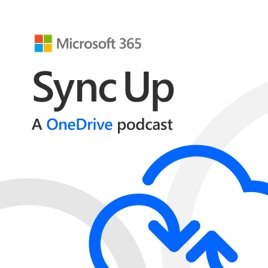
4.6
16
34
Sync Up by Microsoft 365
Microsoft

4.8
1010
160
Genius Bar
Audioboom
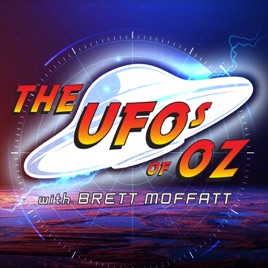
5
2
4
The UFOs of OZ
Brett Moffatt

4.3
72
101
Windows Central Podcast
Windows Central

4.6
24
460
Lockdown Universe (A UFO, ALIEN, BIGFOOT, GOVERNMENT CONSPIRACY AND PARANORMAL PODCAST!!)
LockDown Universe
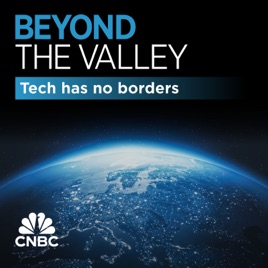
4.3
25
60
Beyond The Valley
CNBC International

4.5
70
100
AdExchanger
AdExchanger Talks
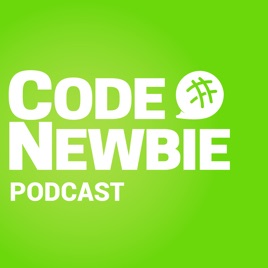
4.7
567
357
CodeNewbie
CodeNewbie




